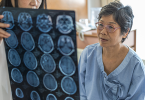This time of year brings on many and varying emotions – but what if those emotions aren’t the holiday cheer you were hoping you’d feel?
Maybe it’s stress brought on by high expectations or the pressures people place on themselves…
Or loneliness as a result of not having loved ones around…
Or maybe even grief resulting from having lost a loved one.
For these reasons, it can feel even more painful and lonely watching others experience the joys of the season.
“The holidays are meant to be a time of joy and celebration,” said Dr. Nagy Adel Youssef, a psychiatrist at Augusta University Behavioral Health and Psychiatry. “It’s normal for these situations to cause sadness. However, in some cases, there may be an underlying mood disorder that can trigger an episode of depression.”
One of those mood disorders is seasonal affective disorder (SAD), a subtype of depressive or bipolar disorder brought on by changes in seasons. Most people with SAD suffer during fall and winter, when the days are relatively shorter – but did you know that it also affects people during spring and summer, when the days are longer?
“Winter blues” or SAD?
First, ask yourself these three questions. Are you:
- Feeling low, a loss of pleasure in things you used to enjoy, unmotivated to work?
- Sleeping a lot or too little?
- Experiencing a changed appetite or an unexplained decrease in energy?
If you answered “yes” to any of these, check out these three ways to determine whether you’re dealing with a case of the “winter blues” or suffering from a mood disorder like SAD. It can be a disorder if your thoughts or feelings are:
- Creating dysfunction. For instance, you’re functioning at a significantly reduced capacity; you don’t have the desire to keep social commitments; your relationships are struggling; or you feel suicidal.
- Creating distress. For instance, you’re feeling emotional pain and suffering or like life is too hard.
- Persistent, lasting for a substantial portion of the day, for several days, long enough to interfere with function.
If you think that this might sound like you – or if you’re not sure – then it’s time to consult a physician or other licensed mental health professional. If you’re experiencing suicidal thoughts, visit your local emergency department, or call 911.
Treatment
For starters, certain lifestyle modifications can help to treat SAD, like getting adequate sleep (average 6-8 hours) and going to sleep and waking at around the same time every day, as well as exercising. If you drink caffeinated or alcoholic beverages, try to cut back or gradually stop. Also if using benzodiazepines, ask your doctor about gradually stopping use, as these can induce depression. It may be tempting to ramp up consumption of these substances during the holiday season, but these can worsen depression and carry can other harmful long-term effects.
Here’s a list of treatment options that your primary care physician, psychologist or psychiatrist may discuss with you:
- Psychotherapy: This involves talking with mental health care provider, who helps you to learn about your condition and the associated feelings, thoughts and behaviors. He or she also gives you tools that you can apply to get back to feeling your best. This can be used to treat SAD and other mood disorders on its own in mild to moderate cases or, in severe cases, may be used in combination with any of the treatments listed below.
- Light therapy: Exposure to a bright medical light for a half hour to an hour during the mornings – so it doesn’t interfere with your sleep cycle – on the shorter days of the year can help with treatment. This is usually prescribed using a medical lamp.
- Antidepressants or mood stabilizers: These are medications that are used to treat mood symptoms.
- Brain stimulation: Transcranial magnetic stimulation (TMS) and electroconvulsive therapy (ECT) are two forms of brain stimulation that treat depression. Augusta University Health is the only health center in the region that offers this form of treatment.
In addition to medical treatment, Youssef offers other guidance.
“One tactic for treating depression in therapy is helping patients to put situations in their life into perspective,” Youssef said. “A great way of doing that can be by giving to others who are less fortunate, even if it’s volunteering one’s time. This can have a great effect on the psyche and morale of the person giving.”
Youssef shares another way that those who are who are undergoing treatment for SAD can help themselves.
“The holidays are supposed to be a spiritual time,” Youssef said. “Being more connected with your faith can work along with formal treatment of SAD. Faith can ground us, especially during times when we feel out of control.”
Don’t settle for a “blue Christmas” or holiday season
For more information or to schedule an appointment, call 706-721-6597, or visit augustahealth.org/behavioral-health.





